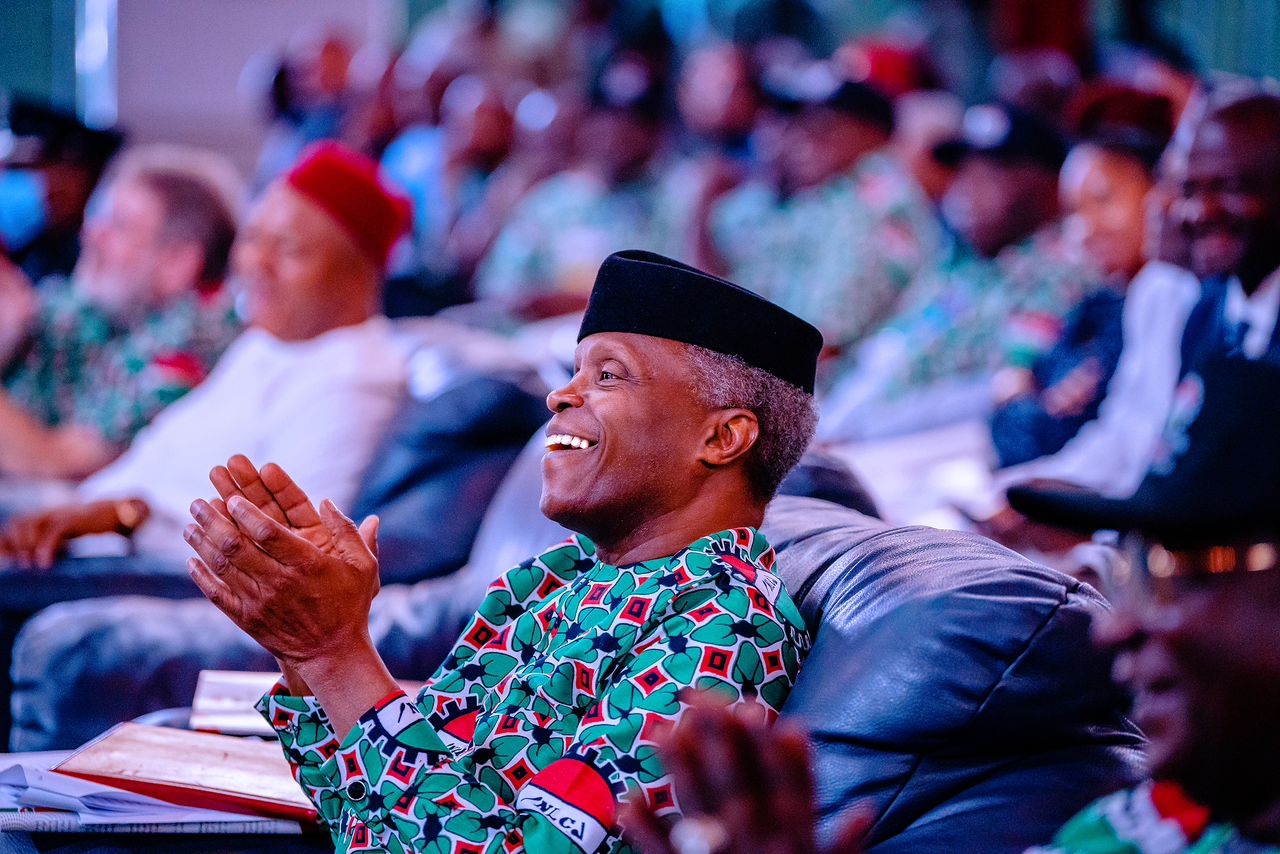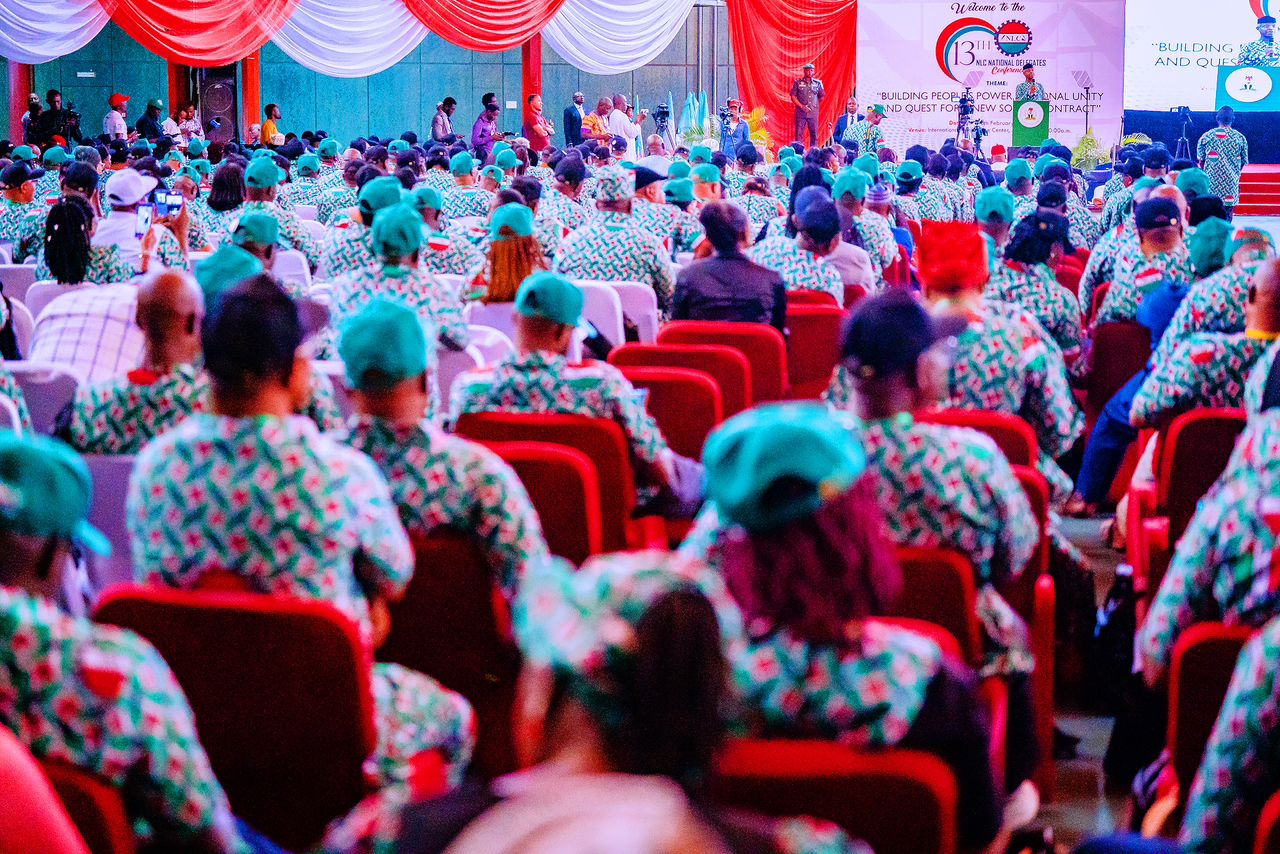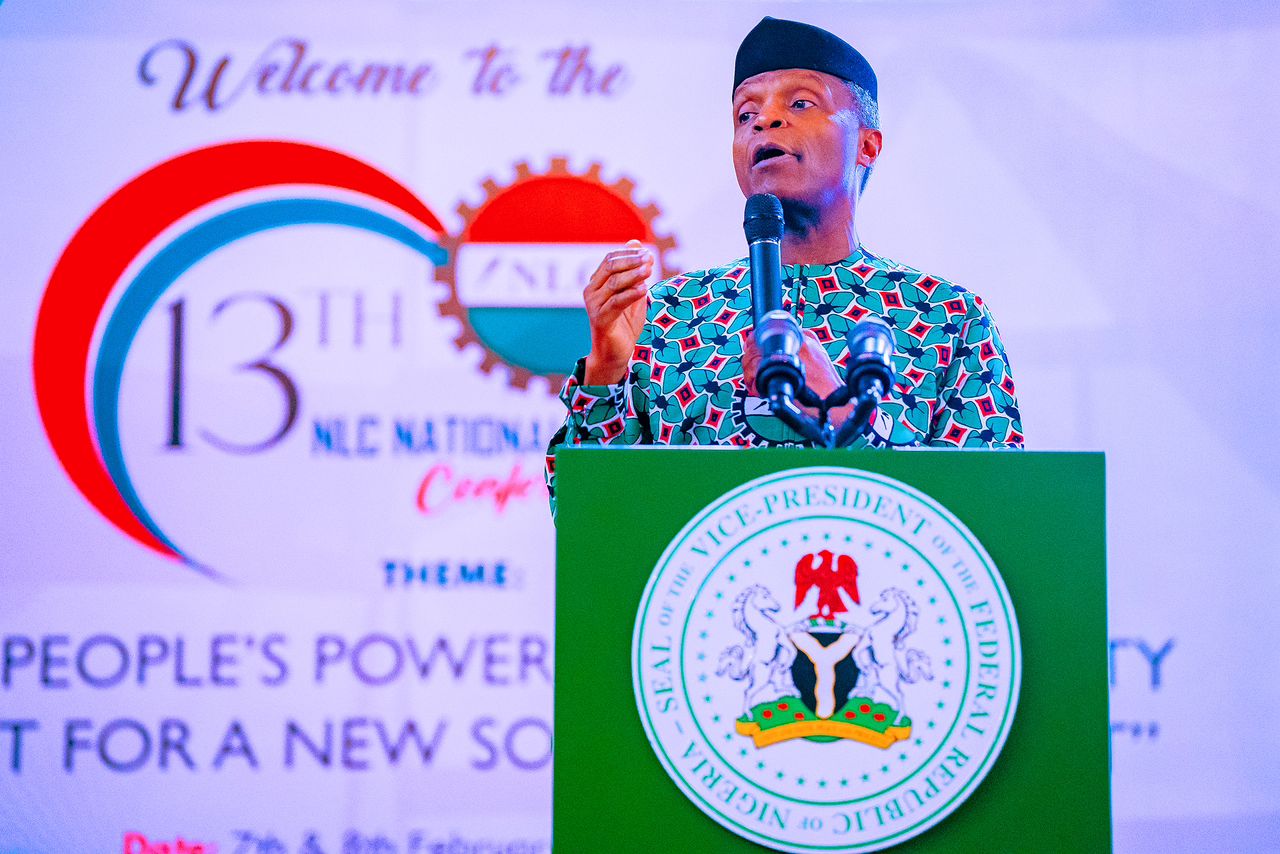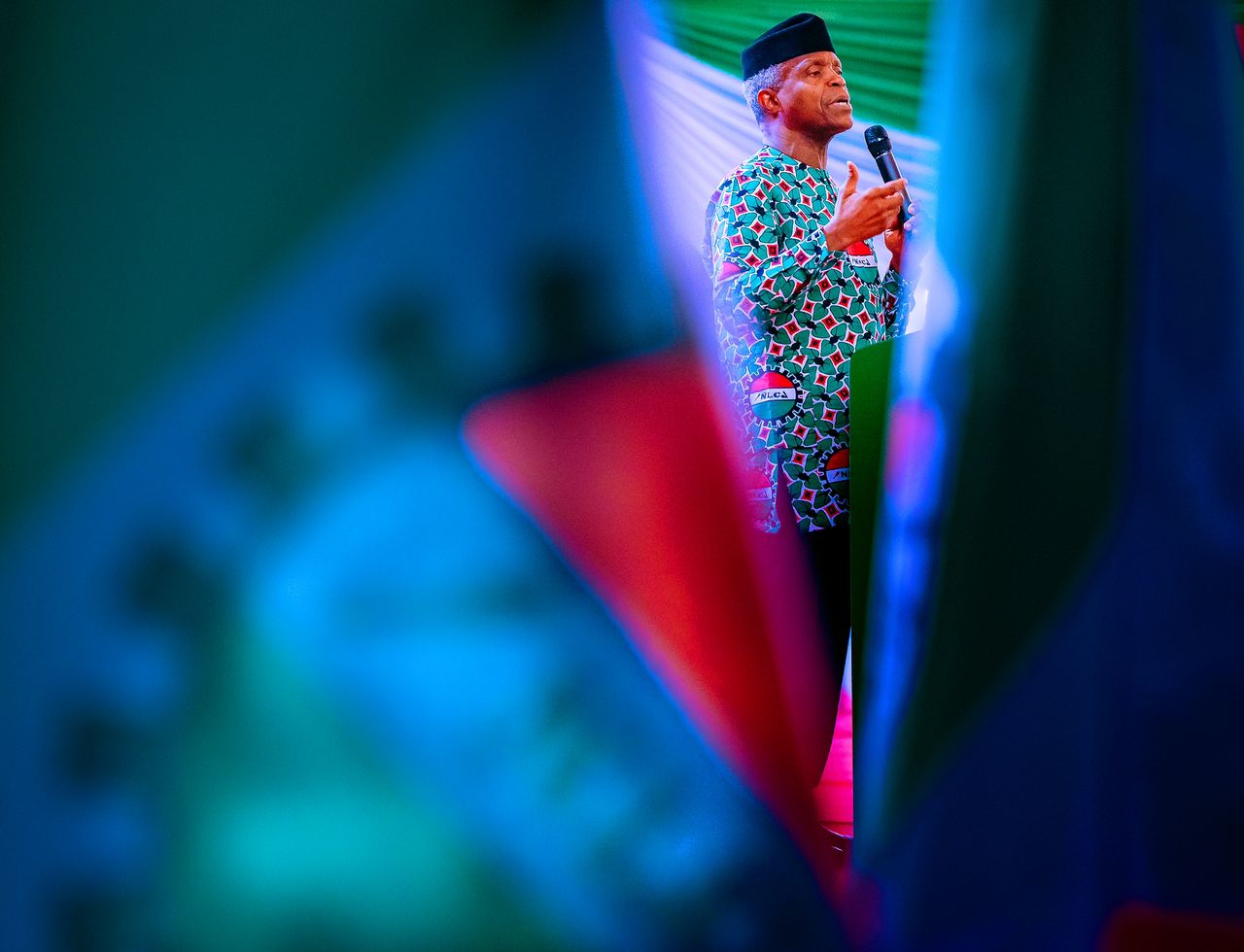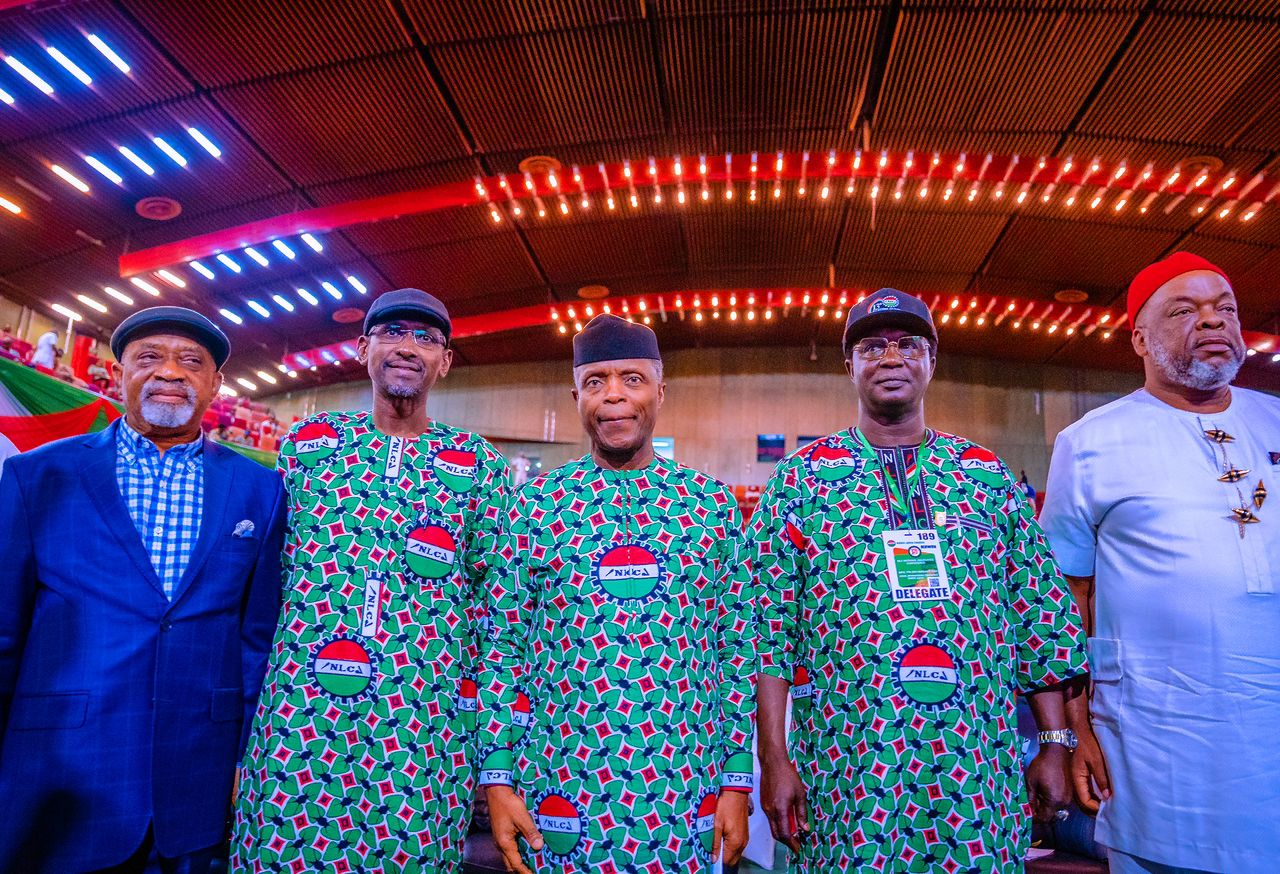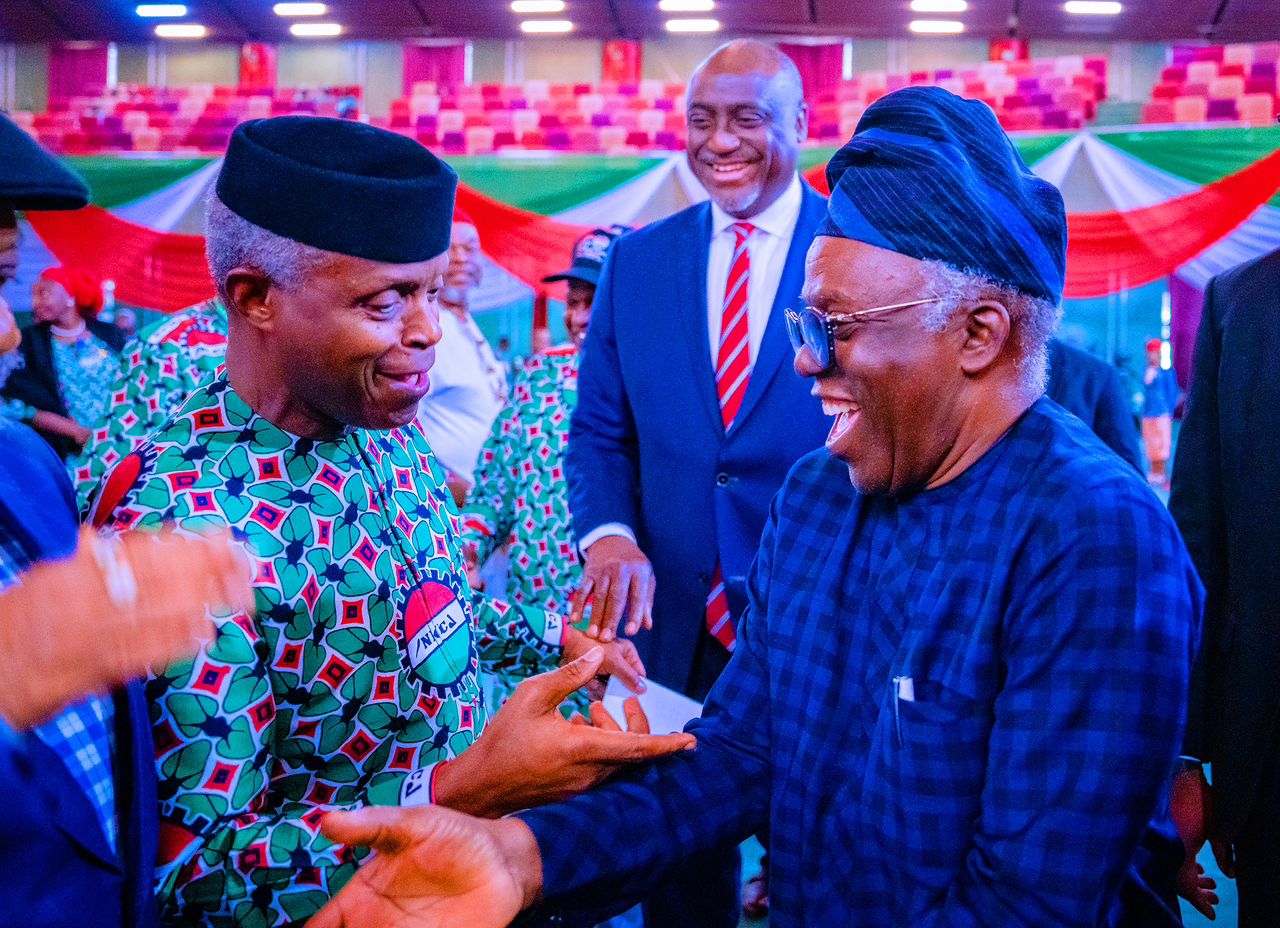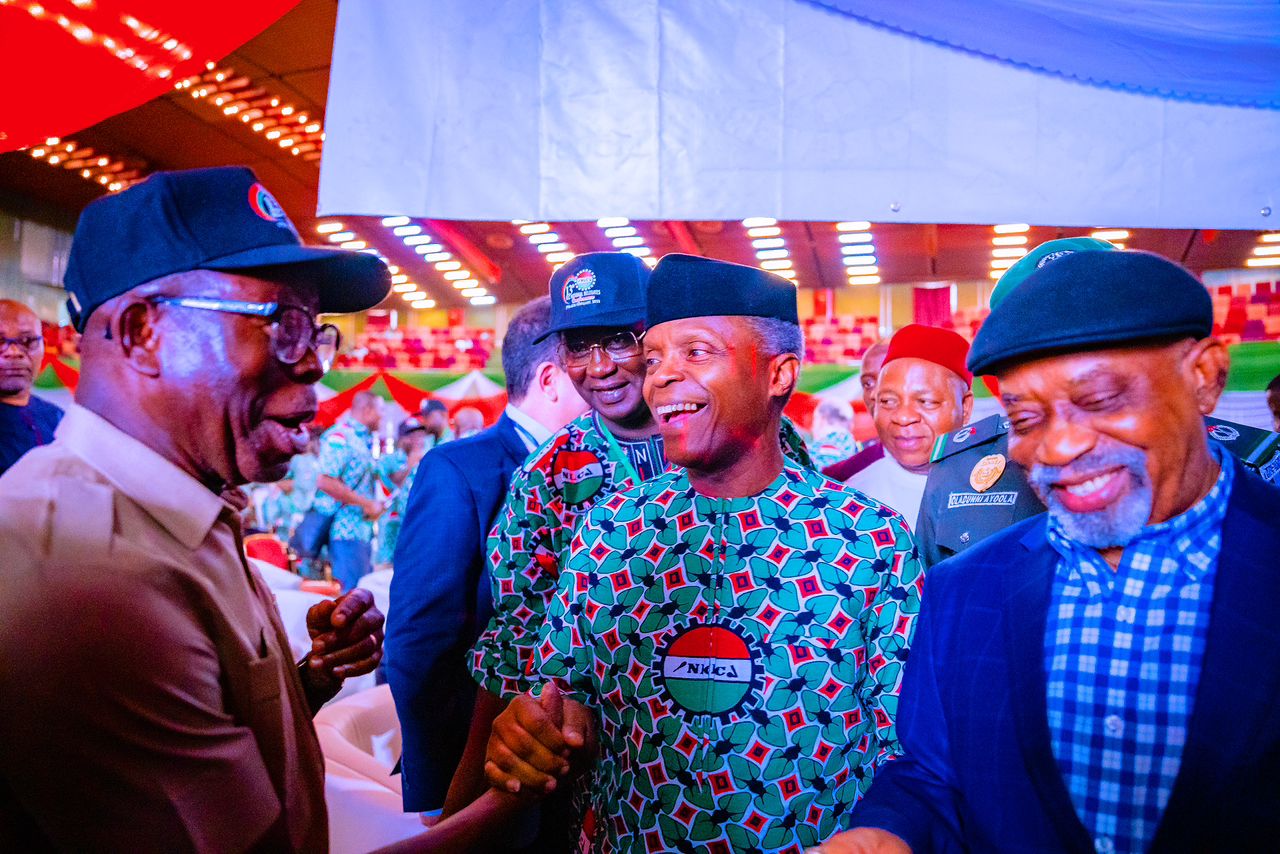13th National Delegates’ Conference of the Nigeria Labour Congress (NLC)
REMARKS BY HIS EXCELLENCY, PROF. YEMI OSINBAJO, SAN, GCON, THE VICE PRESIDENT OF THE FEDERAL REPUBLIC OF NIGERIA AT THE 13TH QUADRENNIAL NATIONAL DELEGATES CONFERENCE OF THE NIGERIA LABOUR CONGRESS ON THE 7TH OF FEBRUARY, 2023
PROTOCOLS
Let me begin by saying how honoured I am to be here today to be part of these proceedings. The Labour Congress is one of the most important constituencies in our country and as the premier organization of working-class Nigerians, it is a key stakeholder in our quest for national progress.
I believe the National Labour Congress deserves our commendation for maintaining this tradition of hosting the National Delegates’ Conference over the years and taking on the complex plethora of issues that would shape the future we want for ourselves, our children and the coming generations.
The theme for this year’s conference – “Building People Power, National Unity and the Quest for a New Social Contract” is entirely appropriate for the times that we are in. It is relevant not just to our nation, but to the entire international system. All over the world, we have seen nations rocked by people-power movements. People are demanding change, systemic change, be it political, social or economic. The last decade started off with the Arab Spring in the Middle East and with ‘Occupy Wall Street’ in the West.
Over the past few years, we have seen other people-power movements disrupt national life and cause policy shifts: the Yellow Vests Protests in France, in Nigeria, the story is not any different. In 2012, we saw the Occupy Nigeria protests sweep our nation. And in the midst of the COVID-19 pandemic in 2020, we witnessed the EndSARS protests.
And people-power is not just street protests, it is in the free press holding power to account, and it is in popular culture, music and other artistic genres deployed in political and social satire. Or put differently, it is the creation and protection of the civic space.
The civic space if I may borrow the definition of CIVICUS is “the place, physical, virtual, and legal, where people exercise their rights to freedom of association, expression, and peaceful assembly. By forming associations, by speaking out on issues of public concern, by gathering together in online and offline fora, and by participating in public decision-making.”
Also, the maintenance of the civic space is fundamental to the promotion of robust engagements across society and with government and other civil authorities with a view to continue fine-tuning the social contract. The Labour Union and other groups charged with the protection of economic civil and political rights must vigilantly prioritize the protection of the civic space.
Aside from open official attacks on civic spaces and fundamental rights, it is often the case in multiethnic and multi-religious societies such as ours that already existing ethnic and religious fault lines are manipulated for social or political advantage and sometimes with the disastrous consequences of civil strife and communal conflicts.
This is one of the reasons why the NLC is such an important institution. It is precisely because your members are united by their shared vocations as working-class Nigerians – an occupational identity that cuts across lines of ethnicity, religion and gender – that the Congress is a veritable pan-Nigerian institution. And this is a critical edge that the NLC must not lose.
I would go so far as to argue that the Congress and other pan-Nigerian organizations are more representative of our people’s lived experience than the one-dimensional groups that tend to define us narrowly solely as members of ethnic communities or members of faiths or creeds.
Indeed, those who hold on pathologically to our differences as the sole grid for defining our national condition are missing the evolving social realities on the ground. The fact is that despite the divisive rhetoric of demagogues and the utterances of those who profit from disharmony, Nigerians do not hate each other. Every day, millions of Nigerians united by their common causes, problems and common issues despite ethnicities and creeds comingle, make common cause and forge friendships across our fabled fault lines. They partner to do business, engage in philanthropy and advance their political goals. They are trading, intermarrying and migrating across this land in search of better livelihoods.
In our markets, motor parks, business centres, in popular culture and our social spaces, a Nigerian identity has emerged transcending ethnicity and religion. Politicians who continue to traffic in division and discord are behind the times and have failed to take note of how much more integrated our society has become. I submit to you that it is the elites of our nation that must adjust themselves to this reality and conduct their politics accordingly.
We are obviously not as united as we should be but national integration is a journey, and we are further along on that journey than we were six decades ago. Our destinies have become so interlinked as to become inseparable. This is why our administration’s heavy investments in transportation infrastructure – road, rail, sea and river ports – which reduce the distances between our people and link localities to markets and enable trade, travel and tourism are more than just infrastructural connections, they are also social bridges, and cultural roads and railways crisscrossing our vast tapestry of dialects, foods, music, dances, customs and of mores.
It bears re-emphasizing therefore that Nigeria is neither unique nor exceptional on account of her diversity. The genre of scholarship and public polemic that problematizes our country’s many ethnicities and religions and characterizes it as a flaw is one from which most of us differ strongly. Our diversity is neither a liability nor a curse; it is, in fact, a blessing and an asset.
Diversity deepens the pool of sociocultural capital available to us; we are enriched by the frothy ferment of the vast multiplicity of perspectives which provide us with a treasury of tools for innovation and productivity. It is fair to say that the countries that have learned to hack the diversity principle are leading the global race for prosperity and progress.
What is at issue in our Nation is not and has never been our diversity but our capacity to manage it with a sense of fairness, equity, respect and justice. There is no denying that diversity can be a harbinger of friction. It is natural. As different groups from various backgrounds and with different worldviews mingle, their interaction is characterized by a degree of tension and even conflict.
All diverse nations find their unique ways of managing the tensions which inevitably arise from the co-mingling of an assortment of peoples.
Let me briefly speak to the issue of the social contract because we expected to consider how to create and continue to fine-tune a new social contract. First, there is a constitutional basis for this covenant between the government and the governed. Our Constitution says that “the security and welfare of the Nigerian people shall be the primary purpose of government.” The second chapter of the Constitution on the “Directive Principles and Objectives of State Policy” elaborates on the thematic areas of the social and economic covenants that bind the Nigerian state and society.
To summarize, its deliverables include accessible qualitative education for the unlettered, affordable healthcare for the sick, inclusion for the alienated, social mobility for the poor, justice for the wronged, security for the vulnerable and freedom for all. It highlights a social vision in which no Nigerian is left behind and one where the state erects a canopy of inclusive and broad-based prosperity in which the security and the welfare of each citizen are guaranteed.
The covenant of course contemplates the citizens’ obligations to obey laws, pay taxes, and respect social order, and the rights of others.
While social inclusion and shared prosperity appear simple enough, it is the creation of an environment that enables talent, innovation and commerce to thrive, that produces the wealth and prosperity, the jobs and opportunities necessary to pay for the social contract. In order words, the social contract by itself means nothing unless we produce the business and commercial environment that is able to pay the price of that social contract.
This is where the rubber meets the road. We have to surmount our chronic productivity problem. 200million people only generating USD 25 billion in collectible revenue is far too small. We need an economic plan that prioritizes value addition.
We simply must encourage value addition, and encourage the private sector. For example in agriculture, our focus must be on processing raw produce, adding value means more jobs and the value chain makes more money. This is the same with mining, we need more beneficiation. We cannot continue to export raw minerals – the beneficiation process is what actually creates the opportunities, the process of adding value add jobs that bring about the prosperity that a mining nation ought to have.
Already, we have seen quite a few investments in gold refining, manufacturing especially light manufacturing is key. We in Nigeria can be the factory for the continent and the rest of the world. We have been discussing the prospects of zero taxes for machinery generally, machines mean production in one form or the other. We must of course encourage investments in information and communications technologies, creative industries, and tourism amongst others.
We have seen the growth of Unicorns in our midst from 2105 till now. 6 Nigerian companies established by young Nigerian men and women all under the age of 35, are now accredited as billion-dollar companies. If in 7, now going on 8 years, we can have 6 companies that are rated around the world as being worth over a billion dollars, the sky is surely the limit. There is plenty of opportunity for growth in our country.
In sum, government policy should be geared toward making Nigeria a value-adding economy, especially in our areas of comparative advantage.
It is important to loosen generalised restrictions on trade. Blanket import restrictions are a dampener on economic activity because many items that might be needed in the manufacturing process might be affected with a consequent negative impact on value addition in the economy. Importation itself is not the problem, it is what you import and what you do with it. Most countries of the world that are major producers and manufacturers are also major exporters.
This is how well-paying jobs and wealth are created. No nation can improve the quality of life of the people without producing more, and without removing barriers to business and commerce. But the social covenant also must provide for those who cannot work. And it would seem that only an intentionally progressive left-of-centre ideological bent can without losing its soul deliver on this aspect of the covenant. It is my view that this is the ideological spectrum to which our party, the APC and the government it produced belong.
Following from our manifesto, our administration sought to lay the foundations of a state committed to social protection. We are catering for our children through the Home Grown School Feeding Programme which feeds 9.5 million children daily and for our unemployed youth through programmes such as the N-Power scheme. Over 4 million people have benefitted from the Government Empowerment and Enterprise Programme (GEEP), and other support initiatives under the National Social Investment Programme.
We established the National Commission for Persons with Disabilities and the National Centre for Senior Citizens to cater for the needs of our compatriots that live with disabilities and our elders. This is a demonstration of our commitment to inclusion – especially of the groups that have long been relegated to the margins.
In a democratic society, the ultimate demonstration of the power of the people is the right to freely elect leaders of our choice. It is through the instrumentality of the ballot, that citizens regulate and discipline their leaders and hold them accountable.
In a few weeks, Nigerians will have the opportunity to demonstrate their power by voting in favour of candidates and parties who have what it takes to manifest the future that we want. I believe this role fits the Labour Congress to ensure that the elections are free and fair, and also promote the rights of people to possess their PVCs.
I wish you fruitful deliberations and I urge you to end this conference with a framework that will guide organized labour in Nigeria in the coming decades.
Thank you very much and God bless you.


